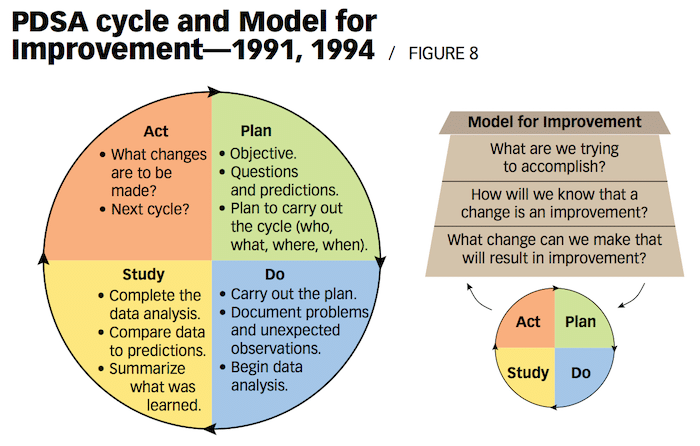By John Hunter, author of Management Matters: Building Enterprise Capability.
Cliff Norman and Ron Moen, of Associates in Process Improvement (API) discuss the history of the Plan Do Study Act (PDSA) Cycle and their research on the subject in the latest Deming Institute podcast (download the podcast). This is the second Deming podcast with Ron Moen and Cliff Norman – listen to their first: Discuss the Evolution of Deming’s Management Ideas.
We previously wrote about the paper they discuss in this podcast, Clearing up myths about the Deming cycle and seeing how it keeps evolving (in a previous post: The History and Evolution of the PDSA Cycle).

Cliff Norman:
The underpinning of Deming’s philosophy is the idea of continuous improvement. And the PDSA cycle underlies that idea. Once you start improving it is going to be never-ending.
…
Deductive and inductive learning, and the iterative nature of those two ideas, are built into the PDSA cycle.
Ron Moen:
Deming used to say in his seminar: “business is more exacting than science.” What he meant by that is, a scientist really does a plan-do-study, you set up your experiments and you share what you learned. Whereas in business… to stay in business you have to continually learn (continuous improvement, kaizen) but also you need to act. So it is more exacting than science you have to act… so not only have you learned but you have to take action based on that.
Cliff and Ron discuss the evolution of the PDSA Cycle, starting hundreds of years ago with the theories of Galileo and Aristotle. Listen as they take you through the progression, from the Shewhart Cycle, through the Deming Wheel and ultimately the PDSA Cycle as we know it today.
Ron emphasized the importance of the iterative nature of learning supported by the PDSA cycle. The importance of iterating the PDSA cycle multiple times is something that I find most organizations would benefit a great deal from. Another API consultant spoke on this importance at the 2006 Deming conference.
Related: Ron Moen Webcast: Prediction is the Problem – Resources for Using the PDSA Cycle to Improve Results – Richard Feynman Explains the PDSA Cycle


